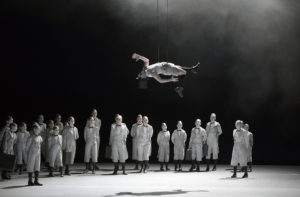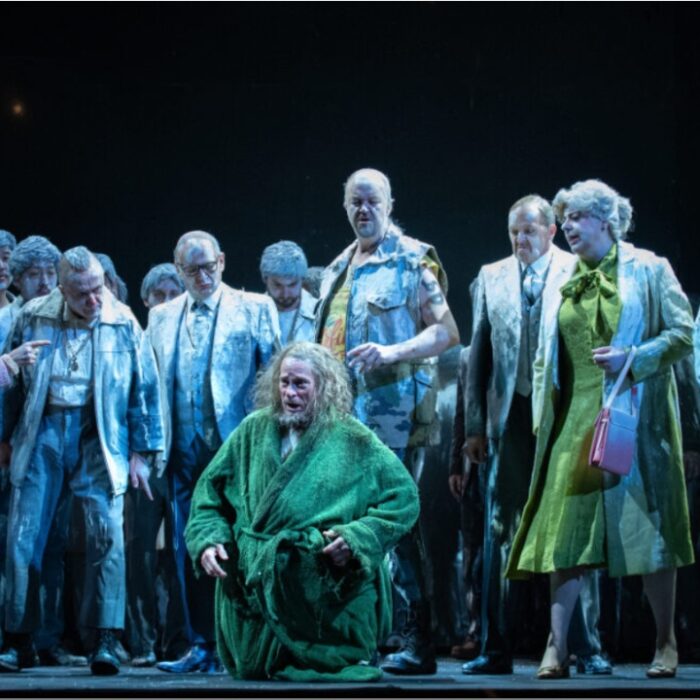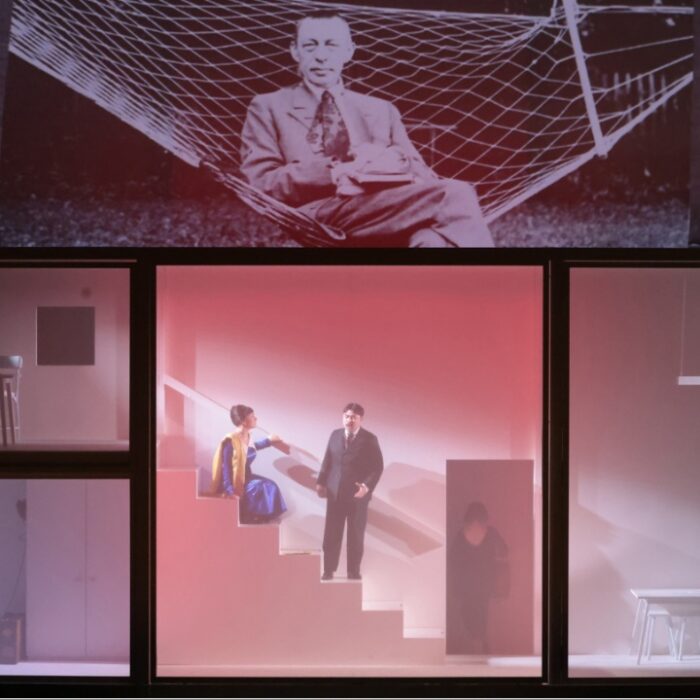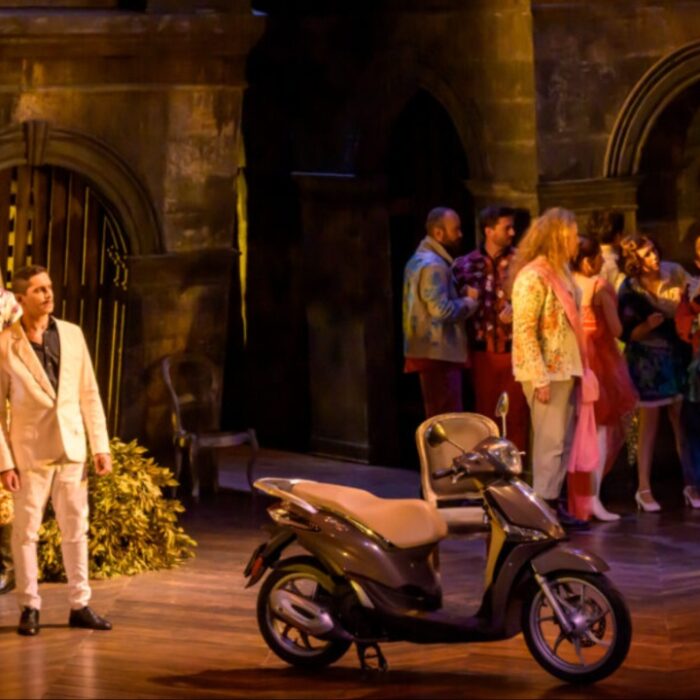
Deutsche Oper Berlin 2019-20 Review: A Midsummer Night’s Dream
Led Jacquelyn Stucker Drye Masterful Turn, Britten’s Masterful Comedy Gets A Riveting Interpretation
By Dejan Vukosavljevic(Credit: Deutsche Oper Berlin/Bettina Stöß)
Based on a comedy by William Shakespeare, Britten and Pears’ “A Midsummer Night’s Dream” had its world premiere at the Aldeburgh Festival on June 11, 1960, with the composer conducting. Britten and Pears tried to bring Shakespeare’s magical world onstage both as a play and as a vocal piece.
Alas, the opera has since struggled to remain a fixture of the standard repertory and at the Deutsche Oper Berlin, the work has appeared only only once in its 108-year history. It premiered on July 8, 1984 at the famous Metropol Theatre at Nollendorfplatz, in the production by Winfried Bauernfeind, with Jonathan Seers conducting.
After almost a 36 years long hiatus, the Deutsche Oper Berlin has brought the opera back onstage, in a fully staged production by the American Director Ted Huffman. The American director made a few important adjustments for this production from its world premiere showcase at the Opéra Orchestre National Montpellier Occitanie in 2019, and thoroughly re-rehearsed the piece with its ensemble. The result will be remembered as a great, thoughtful, and charming staging of a Britten’s comical masterwork.
Less is More
Huffman’s staging, which relied on simplicity of approach, teased and played with the audience, luring them into a dream of Shakespearean proportions. Ladders on stage led directly to the clouds, or the Moon – or to the Heavens – thus giving the Britten’s stratospheric music a special divine taste. Three worlds were thus in constant interaction, bolstering both Shakespeare’s and Britten’s intentions.
Huffman’s staging was full of details, but he never lost sight of the thin silver thread that was connecting the three worlds in subtle interplays. In that way, he liberated the stage and offered it completely to the singers – allowing them a full freedom in bringing the fantastic dramatical account of the dreamy environment of the fairies, as well as the busier and louder world of humans. The uninterrupted flow of both vocal and dramatic energy was palpable as singers were able to freely interact with the stage, shaping it as well, exploring, changing and adapting to bring the best out of their performances.
The production also successfully searched for the magical elements in the vulnerable world of human beings. Huffman explored the connection in a full sense, allowing the humans to dive into the magical world – and to exit it smoothly, having been mildly psychologically bruised and confused during the encounter with the celestials.
Another channel through which Huffman successfully delivered his scenic idea to the stage was in the form of the stylish and innovative costumes by Annemarie Woods. While celestials (including all the fairies portrayed by the fantastic Kinderchor of the Deutsche Oper Berlin) were dressed in light gray suits with cropped hair, humans were in dresses that aligned with the mid-20th century when Britten composed the opera.
Staging a play within a play is always a very challenging, almost daunting task, but Huffman did it exceptionally well during the “Pyramus and Thisby” section of the work. He managed to find several overlapping solutions for the Ovidian play within a Shakesperaean comedy. Besides the general idea of a theater that was accessible for everyone – not just royals – several layers of the comical arose to fully portray the world of the Mechanics. In the end, it proved quite a graceful solution for the six hard working men. Two huge puppets of Pyramus and Thisby finally completed the world of the Mechanics and their theatrical efforts. Thus, the scenic characterization was completed without a single flaw.
Overall, Huffman’s production was an invitation into a dream. It was virtually impossible not to accept that invitation and dive into three hours of pure bliss at the Deutsche Oper.
The Multiple Faces of the Fairy King
Fairies opened the gate to the three-hour evening delightfully engaging in their first aria “Over hill, over dale, trough bush, through brier, over park, over pale, through flood, through fire, we do wander everywhere.” The Kinderchor sang this beautiful and short prelude plain gorgeously.
King Oberon was magnificently sung by the countertenor James Hall. His opening lines “Ill met by moonlight, proud Tytania” warned of an impending Oberon’s revenge. His sound was robust and clear during this passage, revealing a truly vengeful King of Fairies. He was frightening, but in a semi-comical manner.
Britten built the character of Oberon as a high-pitched voice for a good reason – to vocally align the king with other celestials (Tytania and the fairies) and portray him as a being with the supernatural powers. He can be invisible, make magic potions and change destinies. Oberon can also be sweet and willing to help the tormented human beings in need. And that is exactly what James Hall offered to the audience – the multiple faces of Oberon.
Singing “Well, go thy way,” Hall added another dimension of clarity and beautiful phrasing to his voice. He dispatched the famous aria “I know a bank where the wild thyme blows” with exquisite sensuality, his anger at Tytania mildly resonating in his voice. At the same time he was very clear of his intention to liberate the young Helena from the prison of a hopeless and unrequited love.
Hall then showcased the impressive robustness in Oberon’s low range requirements during “Be as thou wast wont to be; see as thou wast wont to see,” waking up his beloved queen from her strange dream with the plentiful and warm sensuality. His tender love for Tytania was clearly audible in the final lines of the aria – “wake you, my sweet queen.”
A Tytania of Britten’s Dreams
Young American soprano Jacquelyn Stucker Drye portrayed the role of Tytania and provided a truly astonishing performance. Stucker Drye has a massive voice that sounds majestically powerful.
That was easily audible during her opening lines “I’ll met by moonlight, jealous Oberon! Fairies, skip hence: I have forsworn his bed and company,” where the soprano offered the first glimpse into her rich, golden timbre. She maintained this vocal gold during the duet “Therefore the winds have suck’d up from the sea contagious fogs.” During these moments, her shining, youthful, potent soprano bloomed with unimpeded energy.
Her vocalism also shone during “Set your heart at rest: The fairy land buys not the child of me.” During this serious fight with Oberon, she blended comedy, anger, frustration, her moves displaying both the defiance and seductive wit.
With her closing lines in the First Act “Come, now a roundel and a fairy song,” it became clear that Stucker Drye was operating on another level. She followed her fantastic performance with some impressive high notes during “our quaint spirits” and easily adapted her voice to the much lighter display as she prepared to fall asleep.
Stucker’s scene with one of the Rustics – the Bottom – was yet another opportunity to hear the seductive color of her gleaming soprano. One could argue that it was actually fairly difficult to simultaneously hold the steady vocal line and offer such a sublime dramatic performance – yet, Stucker did it again. Starting the scene with a deeply, sensually dispatched “what angel wakes me from my flowery bed,” she rose further and further, glowing both vocally and dramatically in “Be kind and courteous to this gentleman.” Her moves echoed deep theatrical intelligence and irresistible charm. Finally, waking from a deep somnolent state, she offered gorgeous singing on “My Oberon! What visions have I seen!”
Finally, Stucker and Hall put a final stamp on the fairies’ world with the lovely duet “Hand in hand, with grace,” where they blessed the marriage of Theseus and Hippolyta. Stucker Drye was not just the queen of the fairies. She was truly the artistic queen of the night.
Hurting Lovers Finding Their Peace
The vocally balanced quartet of four lovers – Lysander, Demetrius, Hermia and Helena – was sung and played by the tenor Gideon Poppe, baritone Samuel Dale Johnson, and sopranos Karis Tucker and Jeanine de Bique.
Poppe delivered the opening lines “ How now, my love” with clarity where he provided the first hints of a reigning passion. As he engaged in “A good persuasion: therefore, hear me, Hermia,” Poppe was sweet and sensual but with a strong and declarative sound. He approached his beloved to persuade her to flee from Athens, and that resulted in their beautiful duet – a signature duet of the lovers – “I swear to thee,” during which both Poppe and Tucker gave us insight into their shining top ranges. The duet was filled with burning passion and masterful dramatic expressions. They repeated their love oaths in a quieter and more sensual “And then end life when I end loyalty!” Later on, Poppe also offered some gorgeous legato singing during “She sees not Hermia.”
Tucker portrayed Hermia in a sweet and gentle way, giving the character the color of true despair. She was a hurting lover, abandoned, despised, forgotten. She showcased her fragility for the first time during “Lysander, help me, what a dream was here,” and gave a heart-wrenching portrayal of a hurting lover during the subsequent quartet. Her strong and bright sound easily penetrated the orchestration throughout this ensemble.
Baritone Samuel Dale Johnson was the powerful Demetrius. Delivering his opening lines “I love thee not” he acted quite forcefully, pushing Helena to the ground. When the magical spell was casted on him – accidentally – seeing Helena his voice exploded in “O Helena, goddess, nymph, perfect, divine!” It was a remarkable account of a strong, yet tormented lover.
Jeanine de Bique was the fourth lover, Helena, desperate and fearful in the beginning , especially during “I will fawn on you, use me but as your spaniel.” De Bique added lots of humor to her performance while singing “And I am sick when I look not on thee,” her sound well-scaled at all times.
The quartet brought a great wealth of dynamics to the stage, both vocally and dramatically. De Bique and Tucker traversed the whole range of emotions, first engaging in a warm hug on “Is all the counsel that we two have shared, the sisters’ vows, the hours we have spent,” all the way to utter anger and frustration.
Tucker excelled at those moments, delivering “Puppet? Why so? Ay, that way goes the game,” in a truly admirable manner. She was angry to the point of semi-aggression and she fiercely clashed with Helena in “let me come to her.” When the fuel of those frustrating emotions was finally spent, exhaustion followed, which enabled quite an effective end to the Act. With the lovers falling asleep, tired of themselves and the world around them, the stage was transformed into the quiet space of many bodies in a deep sleep.
Finally, united in a proper way – with the wrong magic being reversed – the four lovers dispatched powerful and sensual singing on “Like a jewel, mine own, and not mine own.” Their torments finally ended, and they were able to find their peace.
Play within a Play
Baritone James Brian Platt led the group of the Mechanics with a large and deep baritonal voice, exhibiting excellent vocal control. He demonstrated his remarkable quality during “My chief humor is for a tyrant.” The bass offered a very pronounced comical appearance in his bewitched state with ass’ ears. When he engaged in “I have a reasonable good ear in music,” he was followed onstage by a delightful and enchanting percussion. Those sounds provoked more of the comedy onstage, and Platt readily delivered on those motives.
Finally, the baritone found a way to mix comedy and despair while playing Pyramus during “Grim-look’d night! O night with hue so black! Night, which ever art when day is not! Night, o night!” His role was thus completed – and with several distinct emotions circling around him at those moments.
The role of the chief of the group was sung by Timothy Newton. He was perfectly suited for the role of Peter Quince, showcasing his deep, commanding, and persuasive sound during “Is all our company here?”
Tenor Michael Kim offered great singing in the role of Flute, one of the Mechanics preparing the role of Thisby. Kim added several layers of humor to the appearance of the Flute, which were readily audible during “I kiss the wall’s hole, not your lips at all.” Handling the large puppet of Thisby in the final act on the court of the Duke Theseus, his sense of comedy really came to the fore in “Asleep, my love? What, dead, my love?” The final words “Adieu, Adieu, Adieu” were sent across the stage in a hilarious and graceful way.
Matthew Peña , Matthew Cossack, and Patrick Guetti were the remaining members of the group of the Mechanics. Guetti roared in the role of lion, but he was indeed a very gentle lion, himself adding more laughter in the court of the Duke Theseus. His lion’s costume was another part of this grand scheme of comic appearances.
Padraic Rowan and Davia Bouley appeared in the roles of the royal couple. They were much more than pure spectators in the play, actually adding valuable dramatical insights while communicating with the Mechanics.
Rowan portrayed Theseus as a semidrunk Duke, looking for pleasures and a constant close physical contact with Hippolyta. He was vocally persuasive in “Now, fair Hippolyta, our nuptial hour draws on apace.” He managed to continue in the same vocally convincing manner until the very end.
Soprano Davia Bouley showcased the true beauty of her voice in “this day will quickly steep,” immersing herself in the overwhelming comical nature of the production with her nicely tinged voice.
The Little Devil
Actor Jami Reid-Quarrell played the role of Oberon’s magical assistant Puck. Most of the time he was just descending from above, suspended by several strings from the ceiling. It was a clever account of the Puck’s true nature: he was the connection between the celestial world and the world of humans. His acrobatic moves in the air were delightful, as he shifted about slowly, with grace, like a true celestial being through the aether.
It is well-known that the Deutsche Oper orchestra is among the very best out there, but the sounds from the pit left even the most optimistic souls with a sense of outstanding musical achievement. There was an overall sense of a great harmony between the instruments in the orchestra, and Maestro Daniel Carter led the performance with the firm and authoritative hand. It was clear that Carter had a great understanding of Britten’s music, and his approach to the score was impressive. The pit, already big enough, hosted a heavy orchestration in order to fully portray the sounds of ethereal and human worlds. The combination of strings and wind instruments followed the lover’s quartet perfectly, and the brass provided an exquisite and charming tonality. The addition of percussion was only an added pleasure. String glissandos that portrayed the world of Fairies was reminiscent of a fanciful snoring during the state of a deep dream.
The Kinderchor of the Deutsche Oper Berlin sang with utter clarity and sensuality, giving an additional ethereal dimension to all the worlds in this majestical Shakespearean’s saga.
The Deutsche Oper Berlin successfully staged Britten and Pears’ “A Midsummer Night’s Dream” in a breathtaking presentation that left no emotions unstirred and no soul untouched. The fantastic production by Ted Huffman was a perfect basis on which the singers built their unforgettable performances. And there is no other description of it, but that it was completely out of ordinary.
Out of this world.




